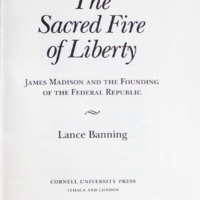-
Title
-
The sacred fire of liberty : James Madison and the founding of the federal republic
-
Description
-
James Madison was the finest democratic theorist that the United States has ever produced. His was the pivotal philosophical role in framing the Constitution and establishing the principles on which a wholly new form of government was to be based. Yet this widely informed and profoundly original thinker has been considered by most scholars to be an intellectual pragmatist who reacted variably and inconsistently to the changing circumstances of the Revolution and the Confederation. Lance Banning's powerful and persuasive reexamination of Madison's thought at the critical early and central stages of his career now changes that presumption, and provides a new base from which thinking about Madison and the Founding must start. The Sacred Fire of Liberty follows Madison from his appearance on the national stage (in Congress in 1780) through the end of 1792. By the end of this period, he had achieved his mature understanding of the Constitution, and his collision with many of the other Federalists of 1788 had made him a leader of the opposition to the administration of George Washington. Banning convinces the reader, through his meticulous research and deeply contextualized presentation of the shifting issues of the period, that Madison indeed held to consistent principles: he was at once a more committed democrat and a less eager nationalist than usually has been thought. The thinking that had underpinned his actions at the great convention, his numbers of The Federalist, and the supposed reversal of positions represented by his joining with Thomas Jefferson to form the first Republican party had firmed by 1792 into the understandings that would guide the rest of his career.
-
Identifier
-
556833
-
801431522
-
Creator
-
Banning, Lance
-
Source
-
Brian Lamb Booknotes Collection
-
Gift of Brian Lamb, 2011.
-
Catalog record
-
Language
-
eng
-
Date
-
1995
-
Program air date: February 11, 1996
-
Publisher
-
Cornell University Press
-
George Mason University. Libraries. Special Collections & Archives
-
Text
-
Transcription of Annotations
Notes on front endpapers: 1. What was M relationship with Jeff; 2.Why was federalist 10 so important; 3. Was Madison a democrat as we know today; 4. What did M. think of H.; 5. What does Federal mean " "Con-federal. 133 pages of source notes, 402 pages of book. Madison 1780-1792. Pragmatist v. a man of principles. "never been a book about the evolution of his founding vision." Madison despised political campaigning p. 235. Lack of Bill of Rights biggest reason for opposition to Const. Who was Kitty Floyd p. 45. Studied the Bible/Hebrew. Sickly at Princeton. He was defeated for the Senate. The Bank-collision between Jeff and Hamilton. The Federalist-No 1-36 published in March 1788; 37-85 ' ' May ". Federalist #10. Underlinings/Notes: Underlinings: Funding sources, prior biographies, Madison's shift to strict Constitutional construction, influences on book, competing interests, details on Madison's life and political beliefs. Meaning of democrat in 18th century vs. 20th. Notes: "Politics of interests not of virtue," "propose a biography," "Irving Brant," "liberal convictions, republican convictions, It was a politics of 'interests' not of virtue," "29 years old," "foreign tax," "national bank," "seeks federal taxes," "army needs money," "a dinner," "Madison for using general revenues," "compromise necessary," "general taxes create unequal burden," "1783," "Princeton," "unequal wealth," "America v. British," "privilege, greed written con. corruption of long term debt," "83' no sign of his interest in constitutional reform," "Kitty Floyd," "1. small states against large; 2. pure federalists against a large republic; 3. Planting states against commercial interests; 4. South against the North," "15 resolutions May 29," "central v. supremacy," "30 veterans of the war were delegates," "Madison opposed state equality in the Senate," "6 days a week, 10 to 3," "notes nearly killed him," "The Federalist Papers," "Brutus," "Hamilton's idea," "Bill Duer's 3 essays," "4 articles a week, 1000 words a day," "enriched understanding of the Constitution," "Fed 14," "160 present," "Oct 31, 1787 scheduled March election," "Patrick Henry," "Lack Bill of Rights biggest cause for opposition," "Madison claim to," "Madison defeated for Senate," "nation's oldest political party," "slavery, natives, women," "Federalist #10," "M and H on military," "Hamilton & Whigs," "Madison less open," "M suffered defeats," "small size of the house," "Vir-might have been a third non-signer."
-
Subject
-
"Madison, James, 1751-1836."
-
"Constitutional history--United States."
-
Relation
-
Original Booknotes interview
-
Rights
-
This work may be protected by copyright laws and is provided for educational and research purposes only. Any infringing use may be subject to disciplinary action and/or civil or criminal liability as provided by law. If you believe that you are the rights-holder and object to Mason’s use of this image, please contact speccoll@gmu.edu.
 556833.pdf
556833.pdf